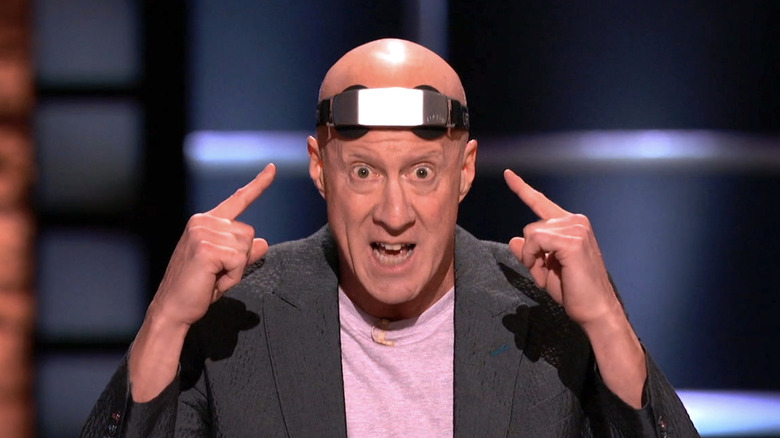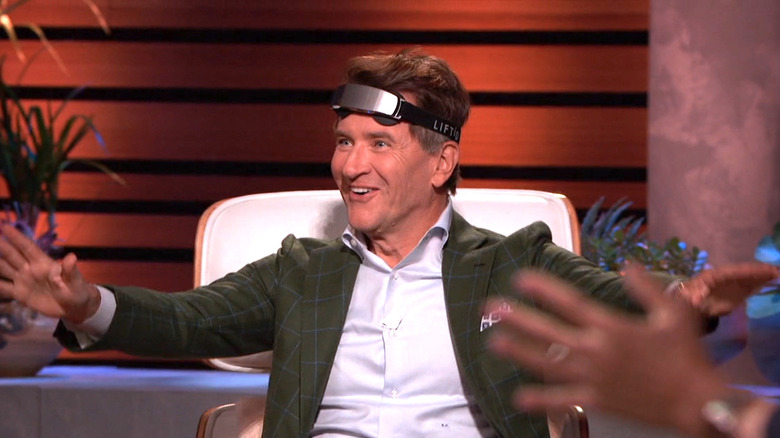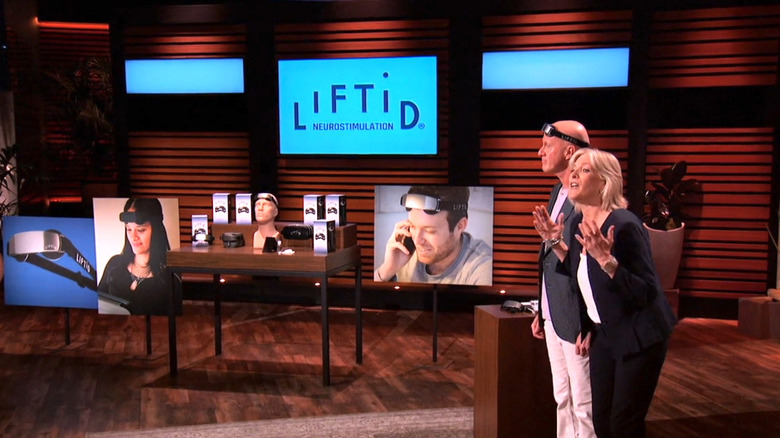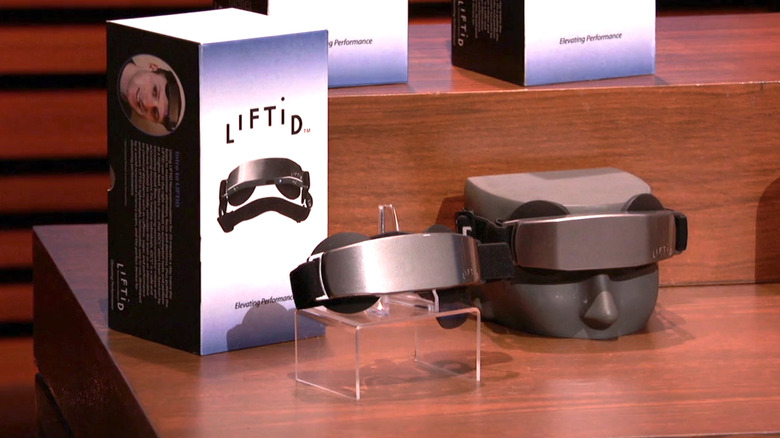What Happened To The LIFTiD Headband From Shark Tank Season 12?
There is often a fine line between bringing enough energy to a "Shark Tank" pitch to get the panel of would-be investors excited about your product and bludgeoning them over the head with so much that none of them even care about what that product is. While the longtime stars of the series have seen their fair share of energetic but offbeat presentations over the years, Ken and Allyson Davidov may have set a new standard for "over-the-top" during their Season 12 pitch for LIFTiD.
To be clear, their pitch wasn't quite as offbeat as the Season 3 presentation for the Sullivan generator. But once Ken gets cooking, it's all the Sharks can do to rein him in so they can actually ask a few questions about his product, a Neurostimulation device that uses tDSC (Transcranial Direct Current Stimulation) to give users a neurological boost akin to that one might get from coffee or other low-grade stimulants. It does so via a pair of electrodes that provide a current directly to the frontal cortex.
Yes, that sounds a little dangerous, and the Sharks were clearly a touch wary of the product from the get-go. They were, perhaps, even more wary as the Davidov's were asking for a whopping $200,000 in investment funds in exchange for just 10% of their company. And as the LIFTiD pitch unfolded, the question quickly became whether Davidov's energy would sway the affections of the Sharks, or lead them to bite his head off.
What happened to LIFTiD on Shark Tank?
LIFTiD's "Shark Tank" pitch actually included a test treatment for each of the Sharks. Even more surprising was that four of the five panelists that night actually gave the product a try, with only Lori Greiner opting out. But before you get too worked up over the Sharks testing out a product that essentially provides something not dissimilar to low-grade shocks to their frontal cortex, you should know that the LIFTiD device wasn't just some half-cocked basement science project. As the Davidovs emphatically attest, LIFTiD comes with all manner of scientific backing and has gone through rigorous testing.
In Ken Davidov's case, he gets a little too emphatic in presenting the device's credentials, and literally cannot stop himself from talking at one point in the pitch. It gets so bad that Kevin O'Leary literally has to demand that Ken stop talking so he can ask a question, and even then, the LIFTiD founder struggles to contain himself. O'Leary eventually laments that the pitch is "one of the craziest" he's ever endured. Robert Herjavec was clearly turned off by Davidov's unstoppable energy, too, pointing out that he didn't stop running his mouth long enough for anyone to absorb what he was saying about the product.
Those Sharks were quick with the customary, "I'm out" offered when passing on a product. Greiner also passed, as did guest Shark Daniel Lubetzky. Cuban eventually does too, but only after reading the device's instruction manual, which outlines several health concerns along with the fact that it may not provide any actual benefits. Alas, LIFTiD left the "Shark Tank" studio without an investment deal.
What happened to LIFTiD after Shark Tank?
The Davidovs were no doubt kicking themselves for leaving those instruction manuals in the test boxes for the Sharks, though it's likely that the panelists were more inclined to pass based on Ken's overbearing energy. Nonetheless, you could see there may have been a certain level of interest in the product prior to things going sideways. While Ken himself might have become a warning for the product boosting a user's energy more than one might want, it seems there was legitimate interest in the LIFTiD Headband by many "Shark Tank" viewers after the episode made its way to air in November 2020.
Indeed, like many other products that premiered on the series' soundstage — Season 4's Zomm Wireless Tether included — LIFTiD was the beneficiary of the so-called "Shark Tank" bump, reportedly seeing a dramatic uptick in website traffic and sales soon after its primetime debut. It didn't take long for the minds behind LIFTiD to leverage the exposure by opening up new sales fronts, offering its Neurostimulator for sale through other online retail outlets, including Amazon and Caputron.
The product continued to sell well even after the initial "Shark Tank" bump, with the Davidovs reportedly managing to push the value of the company to some $35 million. There may be questions about customer satisfaction with the LIFTiD Headband, however, as the device currently holds a less-than-stellar 2.6 stars out of 5 rating on Amazon. To be fair, that number is based on just 3 user reviews, but even the single 5-star reviewer notes that the product may not be worth the $100-plus investment.
Is LIFTiD still in business today?
Despite the question of customer satisfaction, it would seem that LIFTiD is doing just fine from a business standpoint, as the company appears to still be fully operational several years after the Davidovs made their unsuccessful "Shark Tank" pitch. There are a few questions surrounding what path the company will chart in the future, as it seems the devices are no longer available for purchase through either LIFTiD's online storefront or through Amazon, where the Neurostimulator is listed as "Out of Stock" and "Currently Unavailable" respectively. The same is true for Caputron, though you can still purchase replacement sponge inserts for your LIFTiD headset there.
Amazon notes that it's unclear when or if the devices will come back into stock, further clouding the company's path forward. However, the LIFTiD page offers a little more insight into what may be going on, noting that the company is working to redesign and repackage the product, promising that a new and improved headset is in the works. Unfortunately, even LIFTiD does not offer any insight into when its redesigned product will be available to consumers, instead encouraging customers to sign up for a restock notification.
As for Ken Davidov, according to his LinkedIn page, LIFTiD is not the only entrepreneurial venture on his slate. He claims Founder and/or Partner status on several other operations, including Global Ionics, JESCO Venture Labs and Taste Boosters, the last of which makes utensils with built-in sensors to boost flavor and kill unwanted after-tastes. Meanwhile, Allyson Davidov doesn't appear to be in the entrepreneurial game anymore, instead making her living in real estate.



